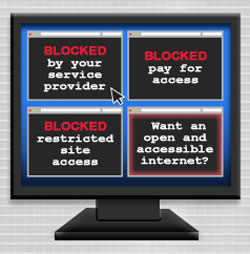Net Neutrality: Securing Equality Online


Three years ago, while campaigning to be president, Barack Obama declared his support for net neutrality:
“What you’ve been seeing is some lobbying that says that the servers and the various portals through which you’re getting information over the Internet should be able to be gatekeepers and to charge different rates to different Web sites…so you could get much better quality from the Fox News site and you’d be getting rotten service from the mom and pop sites… And that I think destroys one of the best things about the Internet—which is that there is this incredible equality there.”
We talk a lot about the free speech issues associated with net neutrality but there are also other, extremely important civil rights issues at stake. The Internet has become a vital tool for everyone to organize and petition the government, access education for career development and distribute diverse materials to their communities. It also provides an unparalleled platform for small entrepreneurs to compete in the marketplace. These advantages depend on all Internet traffic being treated equally, allowing bloggers, community organizers and church groups the same access to people as the mainstream media. If Internet service providers (ISPs) are allowed to discriminate against information to favor their own materials or messages, then the Internet will quickly lose the parity that has made it such an awesome tool for people regardless of their socioeconomic status.
In an effort to safeguard this equality, the Federal Communications Commission (FCC) voted in December in favor of a set of open Internet rules that would help to protect net neutrality. These rules are by no means perfect—and we were critical of them when they were announced—but they do provide at least some safeguards for equity on the Internet.
Unfortunately, Congress is now threatening to use a procedural mechanism, the Congressional Review Act (CRA), to overturn these rules. The CRA give Congress a set period of time to utilize a streamlined process to repeal federal regulations. Worse, if the Act succeeds, it will not only rescind the current protections, but also ban the FCC from establishing any regulations to protect net neutrality without further congressional approval. ISPs would be able to discriminate at will and the FCC would be powerless to act.
Openness and equality are what have allowed the Internet to thrive. It has allowed the poor, the middle class, and the wealthy an equal platform and become the ultimate marketplace of ideas precisely because access is not controlled by funding. However, if we do not move to protect this equality of viewpoints, it will very soon be taken over by the same few companies that control the mainstream media – limiting access for all of us.
Learn more about net neutrality: Visit our What Is Net Neutrality? page. Subscribe to our newsletter. Follow us on Twitter. Like us on Facebook.




